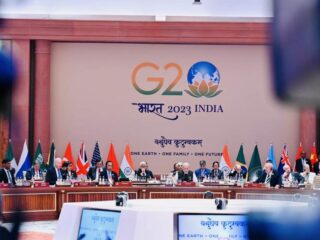Asghar Ali Engineer
(Secular Perspective March 16-31, 2011)
March 8 is celebrated throughout the world as women’s day and this year it happens to be 100th year and so specially significant. However, one does not see much enthusiasm about this day in Muslim countries except some women, aware of this day, demonstrating. They do not betony support from government or even from society as a whole. This year thousands of Egyptian women gathered in Tahriri square with great enthusiasm but far from getting any support they were attacked. It is very shocking indeed.
Again the media and many activists will blame Islam for this. But it is not true. In fact I would like to reiterate that Islam has given equal rights both to men and women in clearly and unambiguously pronounced words. However, this was far ahead of its time and patriarchal society was not prepared to accept it anyway and rather than contradicting the Qur’an, which they could not dare do, they resorted to producing ahadith (pl. of hadith) which totally contradicting Qur’an and also formulated a doctrine that ahadith are extension of Qur’an and as much bound on Muslims as Qur’an itself.
This did the trick and Muslim men in patriarchal society could do what they could not do by directly flouting the Qur’an. It is human nature that even if you accept in theory something as Divine injunction and yet, it goes against your age old socio-cultural practices or against your interests, you would flout it through other means. If all Muslims had followed Qur’an injunctions and values, ignoring their own socio-cultural practices, the world would have been very different in post-Islamic revolution.
But it never happens and women’s question is one of the most delicate questions. In patriarchal society men would never concede equality of rights to women thus foregoing their dominance over women. In western countries we see equality of rights, at least on paper, if not rigorously in practice, it did not happen in a day. The fact that a women’s day had to be observed indicates the struggle women had to wage in those countries and for years.
Until thirties of the last century (i.e. 20th century) women in western countries hardly enjoyed equal rights. Even in communist countries like the Soviet Union, despite belief in gender equality, women were subjugated and had to carry double burden of working outside and inside home. When I visited Soviet Union in nineties of last century and asked to women activists, I came to know how, despite equal rights, they faced all sorts of discrimination and had to be content with inferior position.
This is not justification of what is going on in Islamic countries. It is only explanation of why it is happening. Things are changing in Islamic countries too but women in these countries have to struggle hard and have to face formidable challenges. The greatest obstacles for them are poverty, illiteracy, lack of awareness and theocracy, in that order. These are no ordinary challenges.
Poverty and illiteracy is a result of broad pro-capitalist and market-oriented policies and we do not wish to comment about. These are very different kinds of challenges. However, I would like to discuss theological and socio-cultural challenges which are no less formidable. Unfortunately the theocrats have driven deep into the minds of Muslims that the Shari’ah laws are divine and not a dot or comma can be changed. Not that theocrats believe this doctrine of immutability; they do not want to forgo their own domination and some even feel insecure that overwhelming socio-cultural milieu would go against any change.
The fear of isolation is very real for religious leaders especially in view of the fact that their rivals may take advantage of the same. I had a dialogue with the chief mufti of Saharanpur, (a town which is centre of Islamic learning in India) on validity of triple divorce in one sitting. He not only conceded the fact that it is un-Islamic and must be abolished forthwith. However, he was afraid of taking any public stand saying I would be isolated and no other ulama would support me.
Many Ulama belonging to new generation feel the need for change, especially those who, after completing their theological courses, go to modern secular educational institutions for degree courses. However, overwhelming majority of Ulama are very orthodox, extremely backward in outlook and resist any suggestion for change. Some of them, though not all, believe that shari’ah laws cannot be changed or that no one in our times is qualified enough to do ijtihad (re-interpreting or re-thinking).
What is worse it is men who always do theologizing though, in Islam there is no such restriction at all. Men and women are equally entitled to theologize or be faqih i.e. understand issues and formulate shari’ah laws. But in patriarchal society men never allowed women to theologize or be faqih. Ironical though, most of the ahadith have been narrated by Hazrat ‘Aishah, the wife of the Prophet (PBUH) In history of Islam there have been several women who have been learned scholars of Islam but not even one who founded any Shari’ah school.
Another problem is that Islamic societies never experienced modernization from below. It is ruling classes, rich and powerful who modernized themselves and in some cases they introduced modernization from above and coerced poor and illiterate masses to accept modernization. In former case masses were left out high and dry anyway and in later case masses refused to accept modernization as there lives were immersed in age old traditions and feel no need for change.
In all Muslim countries ruling classes have been enjoying benefits of modernity and their women escape ordinary laws. However, in some Islamic countries like Tunisia, Morocco, Iran during Shah’s time, Turkey and others, modernity was imposed from above forcing women to give up hijab, wear mini-skirts and other western dresses etc. and there was upheaval in the society in many cases.
In some cases like Iran, the ruler (i.e. the Shah) was overthrown and in countries like Turkey coercion had to be used to enforce modernity. There are also countries like Pakistan, Jordan etc. where traditional Islamic laws were codified to reduce its arbitrary nature and to improve lives of Muslim women.
The first requirement to bring about real and acceptable change is to provide universal education comprising all secular subjects. It greatly helps create proper understanding issues and also enables women to know what is going on in the world and around them. In Kerala, India, due to high literacy rate among Muslim women family planning has gone up to 64 per cent as compared to average 35 per cent. It is a great change.
Secondly, there has to be awareness campaign for rights of Muslim women and difference between what Qur’an says and what is found in Shari’ah laws and reasons for these differences. Since our Institute of Islamic Studies conducts such awareness workshops for Muslim women, we have seen how awareness makes all the difference. The notion that Shari’ah law is immutable is removed from their mind.
Such awareness can be created even among women who are either not literate or have gone through only initial stages of literacy but being educated helps a lot in any case. It is also our experience that victims among them (i.e. divorces or those who had to live with co-wives or were deprived of their just right to inheritance etc.) are quick to comprehend and ready to work for enlightenment of other women.
It should also be noted that condemnation of Shari’ah law helps a little in bringing about change. Women like Taslima Nasreen or Hirsi Ali and others have only strengthened conservative forces and further increased problems of Muslim women. What is needed is to understand different factors involved in preventing change and try and remove these difficulties. It is not Shari’ah law which is to be primarily blamed, it is socio-cultural attitudes which stand to be blamed.
And it is not easy to change socio-cultural attitudes which have been around us for centuries. It will take at least few decades that too if there is constant movement to change these attitudes and I must say, to end on hopeful note, change is coming. With modern education spreading even countries like Saudi Arabia where women are most oppressed, change is coming and women are demanding equal rights.
—————————————————–
Centre for Study of Society and Secularism
Mumbai.




